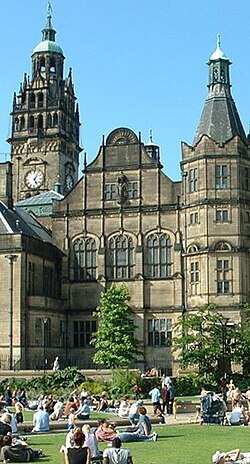.JPG/220px-Peter_Pan_statue_in_Kensington_Gardens_in_the_City_of_Westminster_in_London%2C_spring_2013_(12).JPG) |
Peter Pan statute in Kensington Gardens
|
Last week Northern Ballet danced Peter Pan at The Grand theatre in Leeds. I saw it on Saturday. It was a brilliant production and I have reviewed it in my ballet blog (see
Not too sure about Fairies but I certainly believe in Rachael Gillespie 21 Dec 2014).
Peter Pan was written by J M Barrie who gave his rights in relation to the boy who never grew up to Great Ormond Street Hospital ("GOSH") (see
"Peter Pan and the Hospital" on the hospital's Peter Pan website).
At the time of the assignment copyright subsisted in a literary work for the life of the author plus 50 years. Barrie died in 1937 so those copyrights would have expired on 31 Dec 1987. The expiry of Barrie's copyrights coincided with the passage through Parliament of the Copyright, Designs and Patents Bill. Lord Callaghan of Cardiff took the opportunity to persuade his fellow law makers to insert a new Schedule 6 into the Bill for the benefit of GOSH (see
Hansard HL Deb 10 March 1988 vol 494 cc 805-60 for Lord Callaghan's introduction and the debate on the amendment). In his speech Lord Callaghan said:
"This new schedule would not revive the copyright. That would certainly not be the intention, the purpose or the effect of it. However, it would enable Great Ormond Street to continue to receive the royalties that have been paid under the copyright. But of course any right that the hospital used to have to refuse permission in connection with the work—I think that it was hardly ever refused—disappears and will continue to disappear. Nevertheless, the hospital will continue to receive royalties which, as your Lordships may know, are negotiated between the hospital and those who perform the play or who publish books from time to time. The purpose of the schedule is to provide for that to continue. I hope that that meets with your Lordships' approval. I am grateful for the support which I have had from noble Lords on all sides of the House. I know that the hospital appreciates what has been done."
The government accepted Lord Callaghan's amendment and it is now
Schedule 6 of the Copyright, Designs and Patents Act 1988.
Paragraph 2 (1) confers on the trustees of the hospital a royalty in respect of any public performance, commercial publication or communication to the public of the whole or any substantial part of J M Barrie's play
Peter Pan ("
the work") or an adaptation of it. This provision creates a unique intellectual property for the hospital rather than a copyright as such. This right cannot be assigned (see paragraph 7 (1)) or applied to any other purpose within the National Health Service (paragraph 7 (2)) and the cy-près rule does not apply (paragraph 7 (3)).
The exceptions that would have applied had copyright not expired continue to apply to this special IPR (see paragraph 3). Paragraph 4 provides that no royalty shall be payable for "anything done in pursuance of arrangements made before the passing of this Act." This provision creates an anomaly in that it refers to arrangements made before the
passing of the Act rather than its
commencement. The Act was passed on 15 Nov 1988 but did not come into effect until 1 Aug 1989. It is clear that royalties would not be payable for anything done in respect of Barrie's play between 31 Dec 1987 when copyright expired and the 15 Nov 1988 but it is not clear whether a royalty would have been due for arrangements made between royal assent and the commencement date. This difficulty is now entirely hypothetical because any claim by the trustees would now be statute barred. Moreover, Lord Callaghan remarked that many theatrical promoters continued to donate to GOSH after copyright expired.
Paragraph 6 provides that sums received by the trustees by virtue of this Schedule, after deduction of any relevant expenses, shall be held by them on trust for the purposes of the hospital. Disputes as to the amount of the royalties payable to the trustees are to be referred to the Copyright Tribunal under paragraph 5.
These provisions apply only to the United Kingdom. The minimum term of copyright in the rest of the EU was extended to 70 years by the
term directive (Council Directive 93/98/EEC of 29 October 1993 harmonizing the term of protection of copyright and certain related rights
OJ L 290, 24.11.1993, p. 9–13). That extended term expired on 31 Dec 2007 except in Spain where it continues until 2017 (see
Publishing and the Stage on the GOSH website). In the USA copyright in the play continues until 2023.
It is of course possible for those who wish to benefit the hospital to donate to GOSH and they may do so through the
GOSH charity website and I encourage them to do so.
Should anyone wish to discuss this article or copyright law in general he or she should call me on 01484 599090 or 020 7404 5252 during normal office hours or send me a message through my
contact form.
Post Script
We have our own children's hospital in Leeds which also needs support (see
Leeds Children's Hospital Appeal). Happily Peter Pan (otherwise known as
Gavin McGaig) and Tinkerbell (
Alice Bayston) paid them a visit on 16 Dec 2014 (see
Peter and Tink at Leeds Children's Hospital on Northern Ballet's website). They are two of Northern Ballet's promising dancers and I was fortunate enough to interview Gavin earlier in the year (see
Meet Gavin McCaig of Nothern Ballet 3 Sept 2014), If you want to contribute to the Leeds Children's Hospital appeal
click here for its "Just Giving" page,
.png)

.png)
.png)
.png)
.JPG/220px-Peter_Pan_statue_in_Kensington_Gardens_in_the_City_of_Westminster_in_London%2C_spring_2013_(12).JPG)

